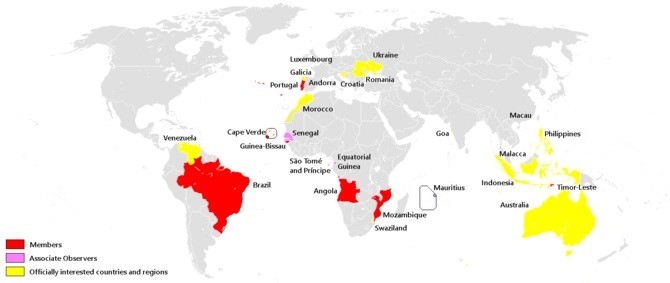Portuguese language reform law goes global
Published on 14 may 2015Spare a thought for this ‘OFFICIAL ORDER TO MIND YOUR LANGUAGE!'
Portuguese has new rules in place since Wednesday 13th May, 2015.
The rules are supposed to apply to all the countries where Portuguese is the official language. Added up, that is approximately 261,000 million people, although Brazil has nearly 80% of the world's Portuguese speakers.
The Portuguese Language Orthographic Agreement (Portuguese abbreviation: NaO)
was signed in 1990 and began being implemented in 2009.
After an initial transition period, official documents from public institutions started to be written exclusively according to the new rules in May 2012. In schools the new rules have been phased in since 2011.
The NaO agreement's main goal is to standardise the sixth most spoken language in the world. (The most spoken is Mandarin, then come Spanish, English, Hindi and Arabic.)
The Portuguese written word is being brought closer to the spoken word, creating a unified spelling to be used in all Portuguese-speaking countries.
NaO was signed by official representatives of Angola, Brazil, Cape Verde, Guinea-Bissau, Mozambique, Portugal and São Tomé and Príncipe. Timor-Leste signed in 2004. Angola and Mozambique have not yet ratified it.
Until NaO, orthographic rules differed between Brazil and the other Portuguese-speaking countries.
If it bothers you that someone corrects how you speak or write, or if you have an urge to correct others, you will grasp the potential for strain within the debate surrounding this rule change.
Differences proliferate among linguists, academics, journalists, writers, translators, artists and political and business societies in the Portuguese-speaking countries.
While the unifying principle of the agreement is ostensibly political and economic (publish printed texts in one version not two, for example), diversifications in languages have a great deal to do with identity; it gets personal.
The NaO changes govern only around 1.5% of Portuguese words, and yet they have raised objections across the Lusophone world.
Petitions calling for the suspension of the implementation are being evaluated by the National Assembly in Portugal, where many feel the reform as a ‘Brazilianisation' of the language and question the purported benefits for users not in Brazil.
Critics deride NaO as interference in culture. They feel it ought to be left to its own devices.
Language professor Marcelo Leite, for example, notes: "Difference is the cool thing," in cultural heritage.
The details considered important to some might seem minor to others, outsiders alike.
Examples? How about ‘penguin' spelled according to the (lately) Brazilian standard, ‘pingüim', while the Portugal standard is (was) ‘pinguim'.
Or: idéia vs ideia (idea), infecção - infeção (infection).
Even hyphens may be grounds for simplification or dispute: há-de as opposed to há de (will be, singular).
Some observers dismiss the perceived ‘ownership' of language as pedantic, and dismiss NaO as silly.
But the new rules are now law.
‘Hey buddy, what did they jail you for?' -- ‘Spelled ‘penguin' wrong.'
Earlier attempts at reform, such as in 1967 and 2002, went some way to stripping out accents and other simplification, but not far enough in some eyes.
Fiction author and former history teacher Jose Geraldo Gouvea, for instance, writes that: "Portuguese has come to have a spelling of its own, hindering the learning of other languages by Brazilians and of Portuguese by foreigners.
"Thanks to the spelling reforms, our literary classics had to be re-edited several times. If you find an old copy of Machado de Assis you won't be able to read it, because the ancient spelling often rendered words completely different."
Gouvea continues: "When I was a child, my school received a huge donation of books for its library, but they were all trashed because they featured four different spellings. Some were traditional, some were Portuguese spelling, some were Brazilian spelling."
Tatiana Vaz Pereira, writing an online comment, describing herself as a lover of the great Portuguese poets Camões and Pessoa, asks: "Is standardisation of language destroying free thinking and therefore cultural diversity... with institutionally imposed rules?"
Pereira contrasts the Portuguese move with the institutional enshrinement of many languages in the European Union bloc (motto ‘Unity in diversity'), now 28 countries using 24 official languages (standardised):
"The EU has a concern for the preservation of its countries' cultural identities."
She concedes, however: "It is actually very hard for a Brazilian person to understand the Portuguese accent, and the Portuguese can be totally in the dark if their Brazilian interlocutor resorts to vernacular a lot. It's like a foreign language to me!
"I see the difference between European and Brazilian Portuguese as a hard-core version of the American/British English pair. Both languages evolved differently and at different times, and have their very own accents, spellings and colloquialisms."
A comment posted under the name Manu Scrita reads: "I am Portuguese, living in Brazil after many years in English speaking countries. I think Portugal would benefit from updating its orthography."
Scrita writes that NaO "...is not the death of the Portuguese language as some nostalgics of the empire seem to feel it is. In fact it shows how alive the Portuguese language is. I have completely integrated it in my writing and I feel also totally free in many writings about contemporary culture to transcribe the street jargons as I hear them. Languages don't die, they evolve."
Source: Euronews


